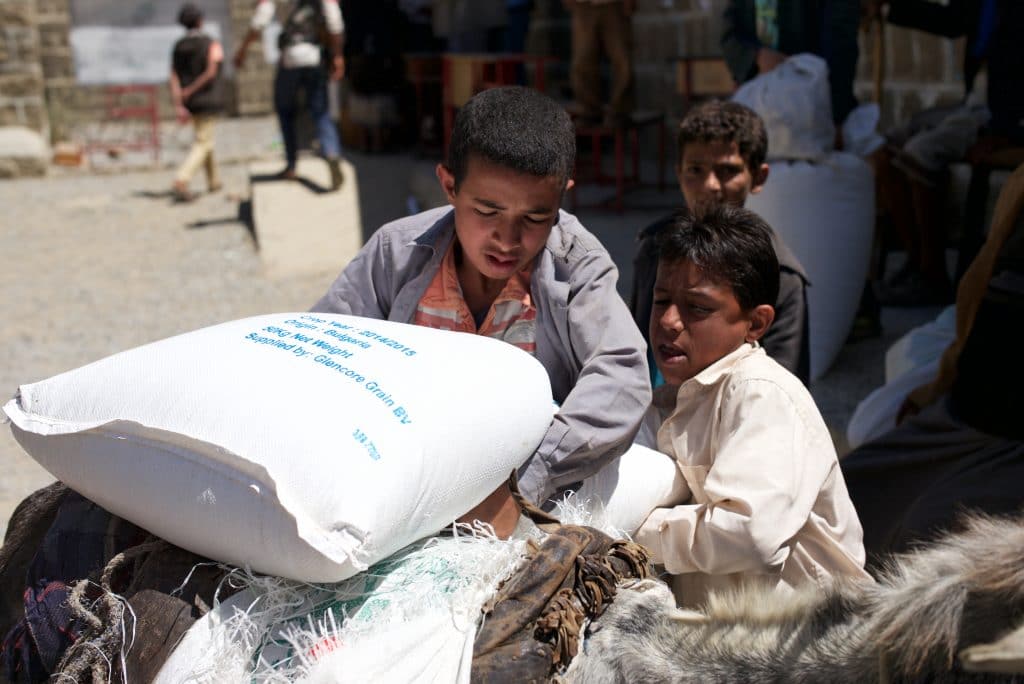Humanitarian biometrics in Yemen
This blog explores the challenges associated with the use of biometrics for the delivery of humanitarian aid in Yemen, including privacy and data protection considerations.

Heartbreakingly for those of us still watching, Yemen continues to descend further into humanitarian catastrophe. Now the scene of the worst humanitarian disaster on the planet, the country has been spiraling deeper into suffering since the war began in 2015 and the ongoing cholera epidemic took hold the following year. The economy in ruins, healthcare system close to collapse, and infrastructure devastated after years of conflict, a staggering 80% of the population need some form of humanitarian assistance or protection – some 24 million people. And now those people, already teetering on the edge of survival, face Covid-19, leading the head of the United Nations Refugee Agency to warm that the deadly virus could ‘delete Yemen from maps all over the world’.
Despite the deepening crisis, humanitarian aid operations in Yemen remain critically underfunded. The UN warns that 30 of its 41 programmes in the country will have to close in few weeks. Some of the resources pledged last year have not yet materialised, causing financial distress to critical life-saving humanitarian programmes. What is more, humanitarian organisations working in Yemen face tremendous challenges. According to reports, they are threatened if they do not make payouts to warring parties, who are alleged to use the funds to finance their war effort.
Humanitarian workers also face threats and restrictions, ratcheting up security concerns and limitations on their movements. During recent years, humanitarian aid is said to have been stolen from humanitarian organisations, in particular the World Food Programme, which declared that it will suspend its operations if the authorities continue to impose restrictions on the programme, their aid personnel, or their warehouses. Last year, Yemeni activists adopted a campaign calling for further transparency by UN agencies, especially in relation to using and disbursing funds for Yemen. Some also levelled accusations of corruption and the squandering of huge portions of funds on international travel, higher salaries for unqualified international staff, and diversion of aid money to warring parties. Activists claimed that only a small portion of funds was reaching those in need – in some cases, less than 30%.
Pledges will not save lives unless they are paid
The dire situation in Yemen has prompted the UN to call, jointly with Saudi Arabia, for a high-level pledging conference for the response to the crisis. The conference convened via an online platform on June 2, 2020 and was attended by around 125 countries and international organisations, UN agencies, and non-governmental organisations. The UN Secretary-General, António Guterres, urged donor countries to pledge generously and to transfer the resources as quickly as possible so as major humanitarian aid operations can be maintained. Some 30 pledging announcements were made, amounting to $1.35 billion; around $1 billion less than that promised at last year’s pledging conference. This leaves a huge shortfall in the $2.41 billion needed to cover the UN’s basic humanitarian programmes in the country for the next six months. UN Undersecretary General for Humanitarian Affairs and Emergency Relief Coordinator, Mark Lowcock, added that “pledges will not save lives unless they are paid”.
Of the pledges announced, Saudi Arabia, which leads the coalition, is to contribute half a billion dollars – the biggest contribution for humanitarian situation in 2020 in Yemen. About $300 million will go to the UN agencies, and $200 million will support humanitarian programmes run by King Salman Humanitarian Aid and Relief Centre. Although other Arab countries participated in the Conference, they have not pledged any financial support. The United Arab Emirates, which is a key actor in the coalition and which directly or indirectly controls some areas in Yemen, has not pledged any money, choosing to refer to funding disbursed to UN agencies or politically charged Yemeni-run organisations. Qatar, among the top ten major donors to OCHA and humanitarian action around the world, did not participate in the conference due to circumstances relating to its withdrawal from the coalition, while Kuwait, surprisingly, did not commit.
It is perhaps understandable that donors feel exhausted and despondent, as we see in the language of figures or numbers and as those who once supported Arab Spring issues turn away to focus instead on problems such as coronavirus and the global economic recession. But it comes at a time when Yemen needs more desperately than ever a political settlement which brings warring parties to the negotiating table with the support of Arab countries and the international community. Donors –– especially those who contributed to what is now the world’s largest humanitarian crisis –– must shoulder their responsibilities by providing humanitarian aid and contributing to post-conflict reconstruction. History will not forgive them if they do not.